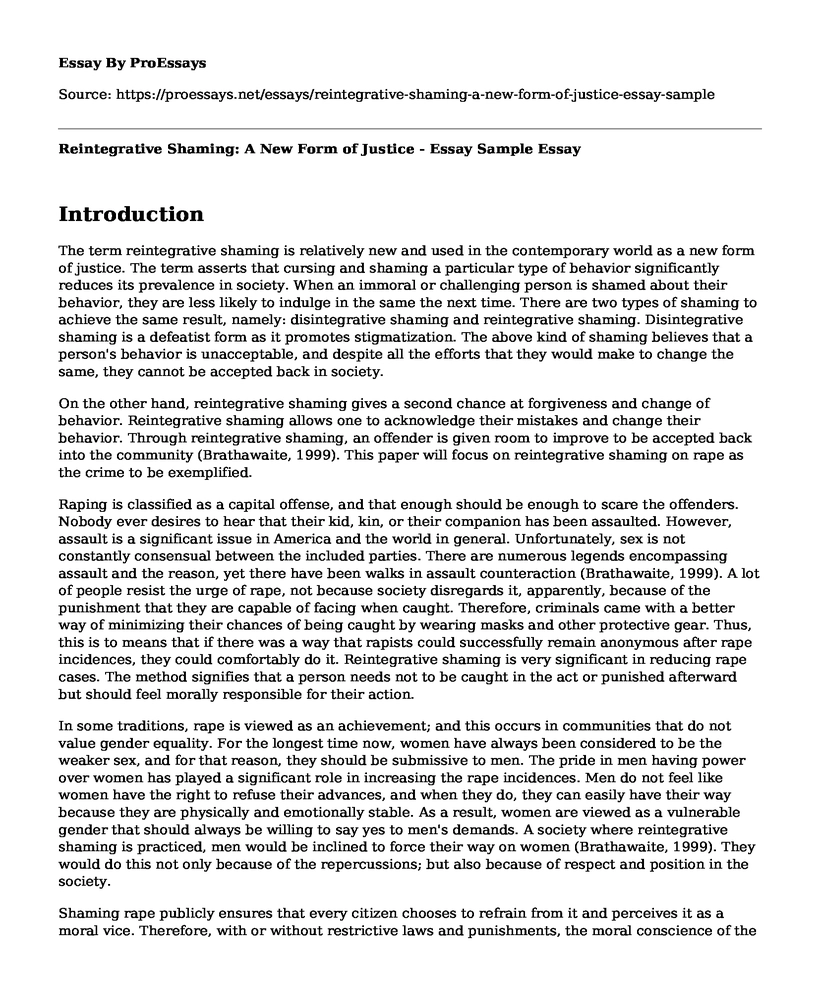Introduction
The term reintegrative shaming is relatively new and used in the contemporary world as a new form of justice. The term asserts that cursing and shaming a particular type of behavior significantly reduces its prevalence in society. When an immoral or challenging person is shamed about their behavior, they are less likely to indulge in the same the next time. There are two types of shaming to achieve the same result, namely: disintegrative shaming and reintegrative shaming. Disintegrative shaming is a defeatist form as it promotes stigmatization. The above kind of shaming believes that a person's behavior is unacceptable, and despite all the efforts that they would make to change the same, they cannot be accepted back in society.
On the other hand, reintegrative shaming gives a second chance at forgiveness and change of behavior. Reintegrative shaming allows one to acknowledge their mistakes and change their behavior. Through reintegrative shaming, an offender is given room to improve to be accepted back into the community (Brathawaite, 1999). This paper will focus on reintegrative shaming on rape as the crime to be exemplified.
Raping is classified as a capital offense, and that enough should be enough to scare the offenders. Nobody ever desires to hear that their kid, kin, or their companion has been assaulted. However, assault is a significant issue in America and the world in general. Unfortunately, sex is not constantly consensual between the included parties. There are numerous legends encompassing assault and the reason, yet there have been walks in assault counteraction (Brathawaite, 1999). A lot of people resist the urge of rape, not because society disregards it, apparently, because of the punishment that they are capable of facing when caught. Therefore, criminals came with a better way of minimizing their chances of being caught by wearing masks and other protective gear. Thus, this is to means that if there was a way that rapists could successfully remain anonymous after rape incidences, they could comfortably do it. Reintegrative shaming is very significant in reducing rape cases. The method signifies that a person needs not to be caught in the act or punished afterward but should feel morally responsible for their action.
In some traditions, rape is viewed as an achievement; and this occurs in communities that do not value gender equality. For the longest time now, women have always been considered to be the weaker sex, and for that reason, they should be submissive to men. The pride in men having power over women has played a significant role in increasing the rape incidences. Men do not feel like women have the right to refuse their advances, and when they do, they can easily have their way because they are physically and emotionally stable. As a result, women are viewed as a vulnerable gender that should always be willing to say yes to men's demands. A society where reintegrative shaming is practiced, men would be inclined to force their way on women (Brathawaite, 1999). They would do this not only because of the repercussions; but also because of respect and position in the society.
Shaming rape publicly ensures that every citizen chooses to refrain from it and perceives it as a moral vice. Therefore, with or without restrictive laws and punishments, the moral conscience of the individual makes them choose not to affiliate with rape. Additionally, justifying rape on the basis of how women are dressed and eye appeal, works on the contrary of reintegrative shaming. Regardless of how women dress, men should have sufficient self-control to appreciate beauty without forcing themselves on women.
Conclusion
In conclusion, people have always thought that instilling moral values and responsibilities has always been the duty of the law. However, people have a significant role to play in the same. The words and actions of people can significantly reduce crime rates such as rape by speaking and acting against it. The secret of reintegrative shaming is communal.
References
Brathawaite, J. (1999). Crime, Shame, and Reintegration. Cambridge University Press.
Cite this page
Reintegrative Shaming: A New Form of Justice - Essay Sample. (2023, May 23). Retrieved from https://proessays.net/essays/reintegrative-shaming-a-new-form-of-justice-essay-sample
If you are the original author of this essay and no longer wish to have it published on the ProEssays website, please click below to request its removal:
- Essay Sample on Criminal Law: UCR, NCVS and NIBRS
- Essay Sample on Criminal Justice System with Reference to Privatization
- The Debate Against Human Right on Torture Essay Example
- Surveys, Qualitative Data, and Victimization Surveys - Essay Sample
- What Aren't You Free to Say? Essay Example
- Essay Example on U.S. Blacks: Racial Discrimination & Criminal Justice System
- Synergy of Human Rights and Ethical Principles in Nursing: A Comprehensive Overview Example







